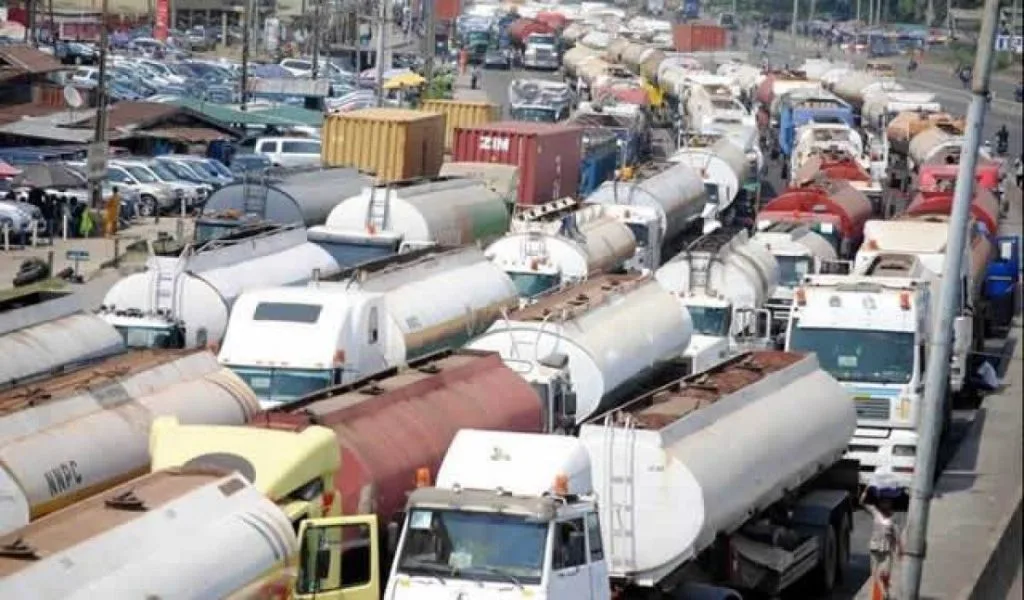A major fuel crisis is looming in Lagos and other parts of Nigeria as petroleum tanker drivers have stopped fuel loading, citing alleged harassment by officials of the Lagos State Government and the Federal Ministry of Transportation. The disruption has raised fears of fuel shortages and possible network blackouts, as diesel supply to telecommunications infrastructure is also at risk.
Reports indicate that fuel trucks were unable to load products on Saturday and Sunday, sparking concerns that scarcity could worsen in the coming days. The Lagos State Government, however, maintains that it is simply enforcing its e-call-up system to regulate truck movements and reduce congestion in key areas.
Join our WhatsApp ChannelDrivers Decry Harassment by Government Officials
The National President of the Nigerian Association of Road Transport Owners (NARTO), Yusuf Othman, confirmed that many truck drivers were unable to load fuel due to actions taken by government task forces. According to him, officials have been impounding trucks, imposing fines, and allegedly assaulting drivers.
“The problem we have now is that the task force in Lagos State has towed our trucks, and they are beating our drivers. They have damaged vehicles belonging to the union,” Othman stated.
He added, “Because of this, there was no loading on Saturday, none on Sunday, and I don’t know if there will be any fuel loading today (Monday).”
READ ALSO: Nigerian Govt To Bar 60,000-litre Fuel Tankers From Roads March 1
Asked whether this could lead to a full-blown fuel crisis, Othman responded, “I wouldn’t know for sure, but when there is no loading for days, scarcity becomes inevitable. The Lagos task force is making things difficult for us.”
Lagos Government Defends Action
Reacting to the claims, the Lagos State Government insisted that its enforcement measures were necessary to prevent disorder and traffic congestion around critical areas like the Dangote Petroleum Refinery.
The Permanent Secretary of the Lagos State Ministry of Transportation, Wale Musa, explained that the enforcement was part of the government’s plan to maintain smooth traffic operations.
“I am aware that some enforcement actions were taken around the Dangote refinery axis. This is to ensure compliance with our e-call-up system,” Musa said.
He warned that tanker drivers must comply with the regulations to prevent the area from becoming another Apapa, which has long suffered from severe traffic gridlocks.
“We won’t allow them to turn that place into another Apapa. Their attempt at blackmail will not work. We urge all drivers to comply for the sake of the public,” he added.
Fuel Crisis Threatens Network Services
The ongoing fuel crisis is also affecting the telecommunications sector, with operators warning that diesel shortages could disrupt network services. The Association of Telecommunications Companies of Nigeria (ATCON) raised concerns that mobile and internet services might be affected if the strike continues.
“If diesel supply is disrupted, network operations will suffer because telcos depend on diesel to power their base stations,” ATCON President Tony Emoekpere stated.
According to him, while some telecom sites have reserve fuel, others are already at critical supply levels. “If there is no immediate solution, services could be affected,” he warned.
Nigeria’s major telecom providers, including MTN, Airtel, Globacom, and 9mobile, rely on infrastructure companies such as IHS Towers, American Tower Company, and Pan African Towers to maintain their base stations. These firms power the sites using diesel generators, making them vulnerable to disruptions in diesel supply.
Call for Urgent Action
Emoekpere stressed the need for contingency plans to protect vital telecom infrastructure. “This situation was not planned for. Even in cases like this, there should be emergency measures to keep telecom services running. This infrastructure is critical and should not be left at risk,” he said.
ATCON has also appealed to the governors of Lagos and Ogun states to ensure that diesel is made available to telecom operators to avoid a complete shutdown.
“This is not just a telecom issue—it is a national emergency that could cripple economic activities and compromise public safety,” Emoekpere noted.
The association further urged security agencies and petroleum unions to resolve the crisis swiftly to safeguard Nigeria’s communication networks. If the fuel crisis is not addressed soon, millions of Nigerians could face disruptions in mobile and internet services, affecting businesses and daily communication.
With tensions rising between the Lagos State Government and petroleum tanker drivers, Nigerians now face uncertainty over fuel availability and network stability. The situation remains fluid, with both sides refusing to back down. The coming days will determine whether a resolution is reached or if the fuel crisis will escalate further.
Emmanuel Ochayi is a journalist. He is a graduate of the University of Lagos, School of first choice and the nations pride. Emmanuel is keen on exploring writing angles in different areas, including Business, climate change, politics, Education, and others.

















